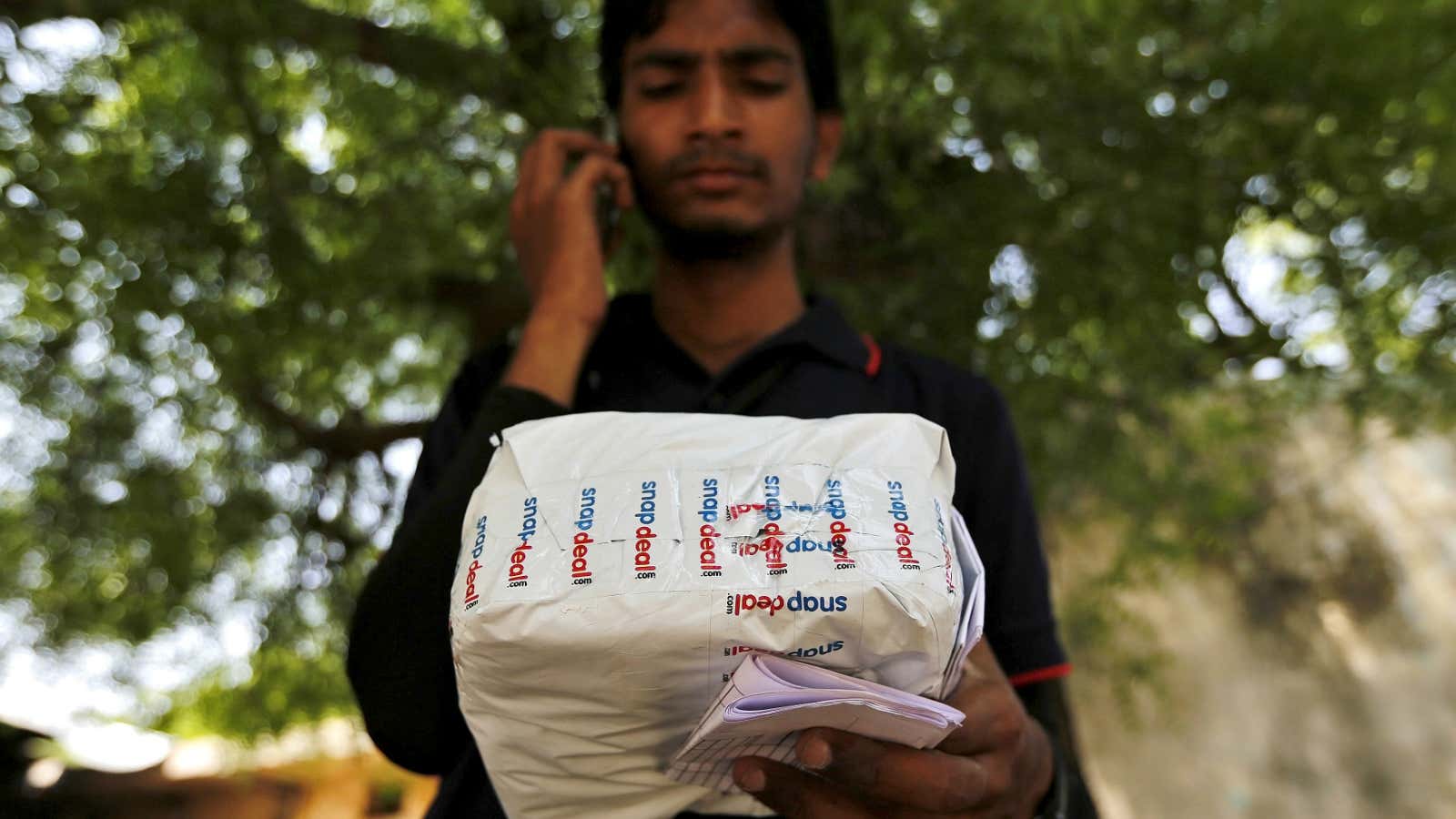There is a prevalent myth that Flipkart, Snapdeal, Ola and all other companies that have raised hundreds of million dollars from global funds are too big to fail. If someone is investing so much money, they must have a plan, right? Wrong.
In the market correction of August-September 2015, the Chinese stocks took a heavy beating, and there were well-founded concerns that the Chinese economy was headed for a slowdown. At the end of September, Alibaba was trading 50% below their peak, and JD was down by 35%. Global funds, which allocated 5-10% of their gains from Chinese IPOs (initial public offerings) to India, were now absorbing a haircut of 35-50%. Tiger’s attempt to shop Flipkart for an IPO failed during the summer, and the company had to push out the plans by two years.
Investors flip between two emotions. One emotion leads to the decision to make an investment and the other emotion leads to the decision to decline. Everything between the two leads to no decision. The two emotions are fear-of-missing-out and fear-of-losing-money. When investors believe that they will miss out on an investment if they do not write a cheque now, they invest.
When investors believe that they will lose their money if they invest now, they decline. When they believe neither, they ask the company to keep doing the song-and-dance and show-and-tell while they wait-and-watch. There are never enough questions that an entrepreneur can exhaust by answering.
Global funds have their genesis in stock market trading. When a bet goes wrong, they cut their losses and run. And never look back. A 5-10% bet can be rationalised as an insurance plan against the regret of missing out on the next China, especially when China has delivered unexpected gains that broke the charts. If the bet starts looking wrong due to lack of liquidity or lack of value, the hedge funds would be the first to look away and move to greener pastures. It has happened before and it will happen now.
When that happens, will the house of cards fall to nothing? Probably not. Companies will revert to the Indian survival gene and investors will revert to consolidation. American companies that fail are known to shut down spectacularly and decisively. There is death. Indian companies that fail are known to vanish into oblivion and survive at a smaller scale. There is reincarnation. Investors will merge portfolio companies so they can show exits to their investors, increase focus and ownership in the combined entities, and give the resulting conglomerate a better shot at delivering an exit. The ecosystem and economics of the country will allow the business the time and runway to weed out the excesses and retain the business that is profitable. The companies will live and continue to have strong national presence. However, they would only be valued at a fraction of their current valuations that have peaked due to the frenzy.
Over a period of four years, German internet conglomerate Rocket Internet invested nearly half a billion dollars in their Indian e-commerce initiatives Jabong (apparel), FabFurnish (furniture) and Foodpanda (restaurants). During that time, Rocket Internet went public in the Frankfurt Stock Exchange and enjoyed a market capitalisation of over 4 billion euros. In a rare and scathing piece of investigative journalism on Livemint, the article revealed how the management and employees of Foodpanda were systematically defrauding the company and pocketing the money. The focus was so sharply on topline growth that any system, erroneous or fraudulent, to convert the investment to revenue could escape the owners’ scrutiny as long as it led to rapid growth in revenues.
A week later, Rocket Internet announced that they were looking to exit all their Indian investments—FabFurnish, Foodpanda and Jabong. Jabong had attempted to sell to Amazon in late 2014 but conversations had fallen through due to their ask of $1.2 billion in valuation. With more than 50% in net losses in 2014, it was going to be hard to sell Jabong even at an all-stock deal at the price of the total investment till date.
Several hyper-funded companies have become holding companies that investors are using as a proxy to invest in other startups in the market space. On one occasion where I was privy to the situation, a venture capitalist (VC) wanted to invest in a promising startup but wanted to do so through a portfolio company that was unable to raise their next large round of funding. Not only were VCs merging portfolio companies into one, they were making new investments through their larger bets, especially as the bets started going south.
In an article titled “The subprime ‘unicorns’ that do not look a billion dollars” by Sequoia’s Mike Moritz, he said ‘…a good number [of unicorns] seem the flimsiest of edifices. Forget the fact that some of these valuations are illusory because the most recent investors have structured their investments as debt in all but name, meaning that they will stand to profit even if the company is worth far less’.
Let me explain. Investors get preferred liquidation—if the company exits at a lower value than the previous rounds, investors first get their money back with an agreed interest or multiple, before other shareholders get returns. This makes the equity investment more like an unsecured debt. Debt investments need to be returned with interest. Equity investments need to be returned with a multiple. Debt investments disguised as equity investments with liquidation preference create illusory valuations.
In reality, it is a way for investors to egg entrepreneurs on to take more risk and build a larger business faster. Investors enjoy the upside in case of success and protect their downside in case the company shrinks in value. The larger the investment, the higher the benchmark for success. Larger investments demand larger rewards, while creating an illusion of lower risk. When the gap between the expectation and reality lingers for a while, companies learn to come up with ways to explain it away and stop holding themselves accountable to taking those million small steps to get to a billion dollars.
You have to earn your way to the top of Mount Everest. Landing there on the best helicopter of the world will get you there for a few quick selfies and then kill you after a few minutes.

Excerpted with permission from Roli Books from the book, The Golden Tap, authored by Kashyap Deorah. We welcome your comments at ideas.india@qz.com.
